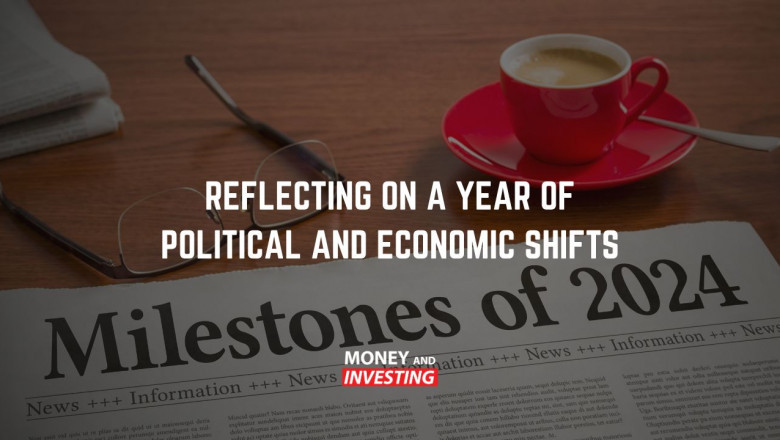views
As the year draws to a close, it’s the perfect time to take a step back and reflect on the events that shaped economies, politics, and financial markets. From record-breaking stock market performances to global conflicts and rising living costs, the past year has been eventful. Let’s review the key highlights and their implications moving forward.
Stock Market Performance and Economic Growth
This year delivered a strong performance in global markets. The S&P 500 rose approximately 27%, achieving 51 record highs throughout the year. Despite initial fears of overvaluation, earnings growth and lower inflation levels supported market gains. Historically, presidential cycles influence markets, and the data suggests that the year following an election often delivers solid returns. Investors may anticipate continued growth next year, supported by stable corporate performance and moderated inflation.
Australia’s Budget Surplus and Economic Challenges
Australia experienced a budget surplus of $9.3 billion—the second in as many years. However, this surplus may be short-lived due to ongoing government spending and economic pressures. High corporate tax revenues early in the year contributed to the surplus, but with slowing economic growth, the outlook remains uncertain. Rising living costs, stagnant wages, and high interest rates pose challenges, making fiscal management a key focus for policymakers.
Global Trade Policy Shifts
Trade policies also saw significant developments. Nearshoring gained traction, particularly in North America. Companies began shifting manufacturing to Mexico to avoid disruptions caused by long supply chains, trade disputes, and logistical delays. With the upcoming U.S. administration expected to prioritise domestic manufacturing, further changes to trade agreements, especially under the North American Free Trade Agreement (NAFTA), may reshape global trade dynamics.
Cost of Living Pressures and Interest Rates
Inflation and interest rates were major themes this year. While the U.S. Federal Reserve responded with interest rate cuts to control inflation, Australia took a more conservative approach, keeping rates high. Rising costs in housing, fuel, groceries, and insurance have strained household budgets, and many consumers are looking for relief. Policy decisions in the coming year will determine whether rates will ease, providing much-needed breathing space for borrowers.
Retail Sector and Market Competition
Supermarkets Coles and Woolworths faced scrutiny for alleged price gouging amid rising living costs. Dominating the grocery market, these companies drew criticism for exploiting their duopoly, leading to investigations into unfair pricing practices. Meanwhile, consumers have increasingly turned to discount retailers like Aldi for better value, highlighting the need for stronger market competition.
Geopolitical Tensions and Global Conflicts
Geopolitical events also influenced markets. The ongoing conflict between Israel and Palestine raised concerns about broader instability, with the U.S. playing a key role in providing military support. Despite fears of escalation, efforts towards ceasefires offer hope for peace. At the same time, China’s economic slowdown, rising unemployment, and deflationary pressures remain global concerns, especially as its manufacturing dominance faces challenges.
The Rise of Cryptocurrency
Cryptocurrency made a strong comeback this year, riding on the back of bullish equity markets. As digital assets gained traction, discussions about potential regulation and gold-backed cryptocurrencies emerged. While still volatile, crypto continues to attract investors seeking alternative opportunities in the digital economy.
Media and Political Influence
This year saw a shift in how people consumed information. Traditional media outlets lost ground to long-form podcasts and independent platforms, which offered unfiltered perspectives on politics and finance. Interviews with influential figures provided deeper insights, highlighting a growing preference for direct and transparent communication.
Looking Ahead to the New Year
As we prepare for the year ahead, the focus will remain on economic recovery, market stability, and political developments. With elections looming and new administrations taking office, shifts in policies and trade agreements could create new opportunities and challenges. Investors and consumers alike will need to stay informed and adaptable to navigate the changing landscape.
Final Thoughts
Reflecting on this year’s events underscores the importance of preparation and adaptability. Whether investing in markets, managing household finances, or evaluating economic trends, staying proactive is key to building long-term stability and growth. With optimism for the coming year, now is the time to plan ahead and take control of financial goals.






















Comments
0 comment